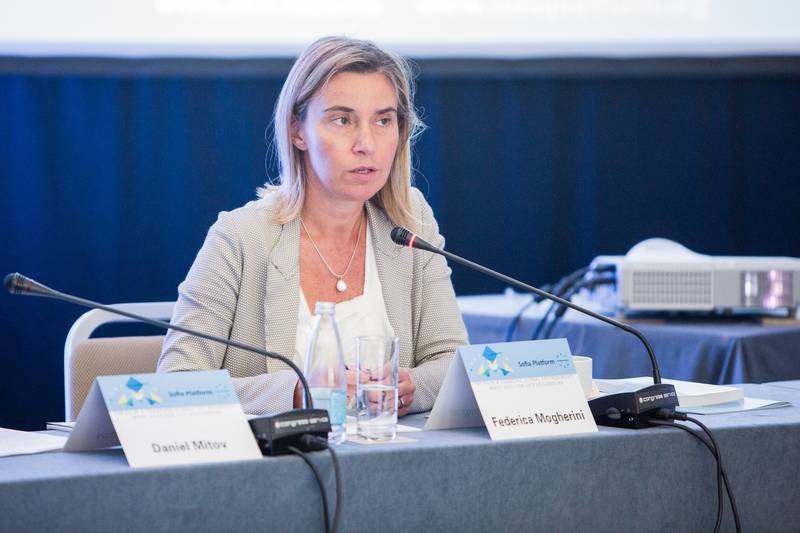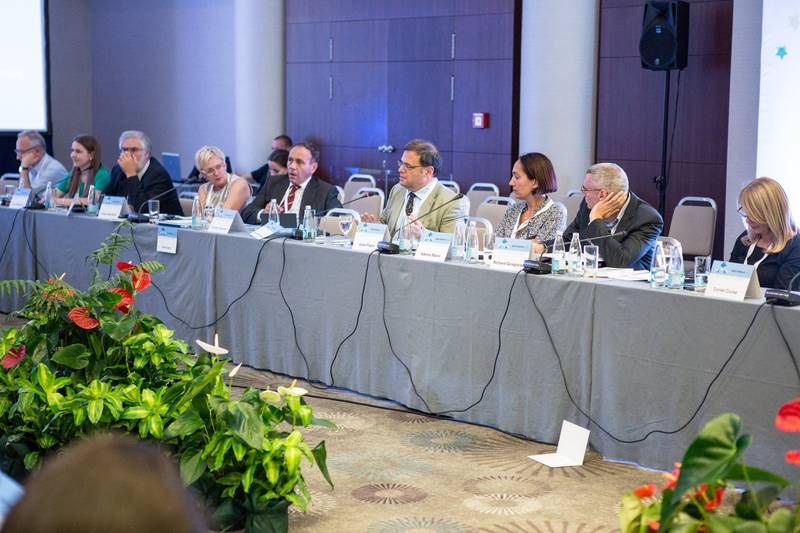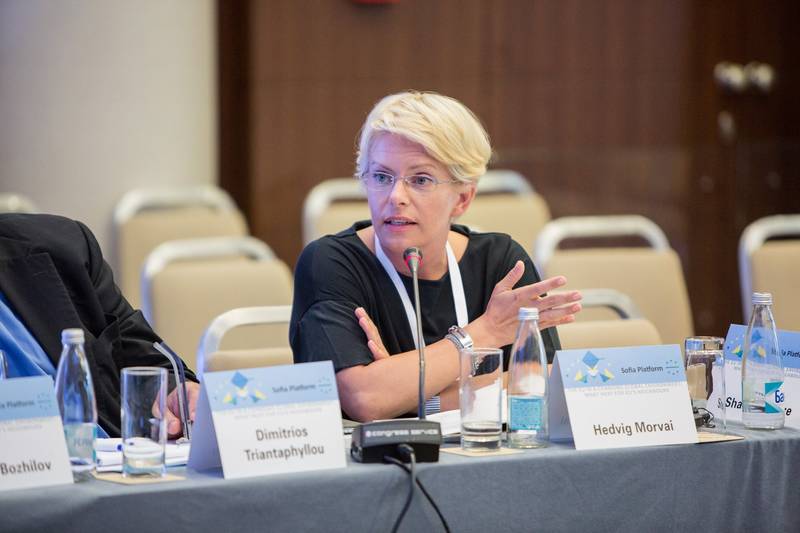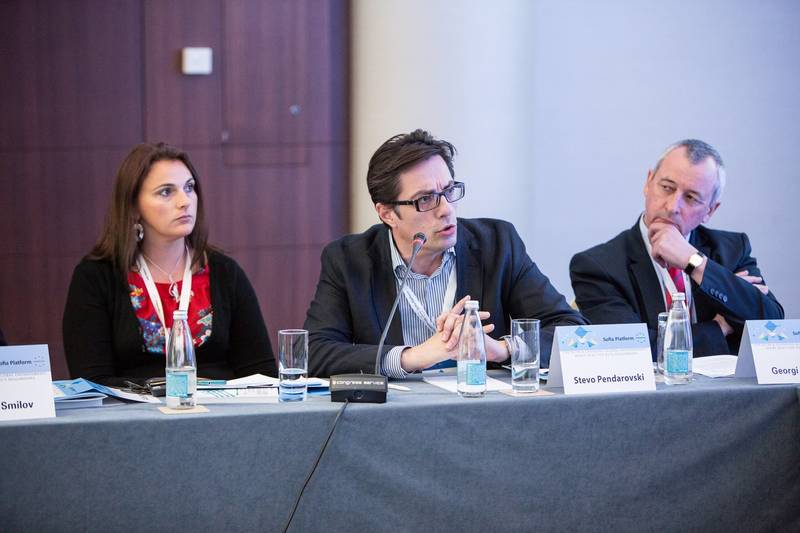Last Chance for EU and Western Balkans
Adelina Marini, August 25, 2015
 On Thursday, in Vienna, starts the annual summit of the Western Balkans that was initiated last year in Berlin and became famous as the Berlin Process. Lead subjects on the agenda of the prime ministers of Serbia, Bosnia and Herzegovina, Macedonia, Kosovo, Montenegro and Albania, and also Croatia, Slovenia, Germany, France, Italy and Austria will be the refugee crisis, the economy, and regional cooperation. The key message of the EU states last year was the well familiar one – the European perspective remains valid, provided criteria are met. In the space of a year a lot has passed and the degree of intensity in the region has risen. The 90’s rhetoric has returned, old grudges are floating back to the surface, nationalisms are flaring up again.
On Thursday, in Vienna, starts the annual summit of the Western Balkans that was initiated last year in Berlin and became famous as the Berlin Process. Lead subjects on the agenda of the prime ministers of Serbia, Bosnia and Herzegovina, Macedonia, Kosovo, Montenegro and Albania, and also Croatia, Slovenia, Germany, France, Italy and Austria will be the refugee crisis, the economy, and regional cooperation. The key message of the EU states last year was the well familiar one – the European perspective remains valid, provided criteria are met. In the space of a year a lot has passed and the degree of intensity in the region has risen. The 90’s rhetoric has returned, old grudges are floating back to the surface, nationalisms are flaring up again.
Just a few examples are sufficient. A football game ruined a historic and long planned meeting between the prime ministers of Serbia and Albania. The meeting did take place anyway but ended dramatically when the Albanian PM stated that sooner or later Serbia would have to accept the fact that Kosovo is an independent state. The mysterious release from custody of the charged with war crimes Vojislav Šešelj by the Hague tribunal, which cited the Serbian radical’s health condition, brought into the open how high the threshold of tolerance towards militaristic, xenophobic, and nationalistic speech really is. His public performances, coupled with the silence of Serbian authorities, aided a lot for the heightening of tension between Serbia and Croatia. A contribution to the raising temperature on the Balkans made the commemoration of the 20-year anniversary of operation “Storm”, which Croatia reinstated its territorial integrity with in 1995 and finished its separation from former Yugoslavia. During the celebrations many Fascist and anti-Serb chants were heard, also remaining uncondemned by the political elite.
And, while the EU concentrated on the negotiations between Belgrade and Priština, somewhat surprising to the Union, there came the implosion in Macedonia. To top it all off – a border dispute, that the EU thought solved, has been reopened between Croatia and Slovenia. In the span of the past year the EU proceeded decisively towards solving the long standing crisis in Bosnia and Herzegovina by accepting the German-British initiative, but its success is still ambiguous. Broadly speaking, the Western Balkans are turning more and more into a problem that the EU once again looks unable to solve, especially in the current geopolitical situation with Russia reminding it has interest in the Balkans as a Russian sphere of influence.
Western Balkans – a glass half-full or half-empty?
At the end of July, in Sofia, was held a round table*, organised by the European Council on Foreign Relations and the Sofia Platform, a large portion of which was dedicated exactly to the future of the Western Balkans – more specifically to their European future – with the participation of the High Representative of the European Union for Foreign Affairs Federica Mogherini. During a two-hour discussion, with the participation of Bulgarian Minister of Foreign Affairs Daniel Mitov and representatives of non-governmental organisations from the Western Balkans, this website included, Ms Mogherini demonstrated an extremely rare and long overdue sincerity, but also a large dose of contradiction. She refused to accept the metaphor of the half-full or half-empty glass of the state of the region, for the glass is static, while relations with the Western Balkans are a process. To some, there is no progress in the process of  convergence between the Western Balkans and the EU, but she thinks there is. She concentrated mainly on Bosnia and Herzegovina and the Belgrade-Priština dialogue.
convergence between the Western Balkans and the EU, but she thinks there is. She concentrated mainly on Bosnia and Herzegovina and the Belgrade-Priština dialogue.
She insisted, the mantra of the five-year freezing of enlargement is overcome and stressed that this is the period for hard work towards the Western Balkans countries being ready for membership. Moreover, she said that if the right approach is not found in the next four and a few years, the EU will lose the region forever, and added, as if asking herself, whether it is not already too late. “It’s the last chance. I think EU, all of it - institutions and Member States together - need to move on the enlargement as much as the accession countries do”, she said. She repeated an old argument of hers, back from the time when she was a minister of foreign affairs of Italy that the EU had to abandon its fatherly approach.
She rejected the stick-and-carrot approach as well, although it is being used in the EU itself. It is best felt in the relations with Greece, also with Bulgaria and Romania that are still under special monitoring by the EC in the spheres of justice and fight against corruption and organised crime. Federica Mogherini also refused to accept another narrative, especially popular in the Western Balkans region – that the EU prefers stability to democracy.
“I refuse completely to get into the narrative of stability versus democracy because there's no stability, sustainable, without democracy and there is no democracy for real if you don't have a stable environment. And the Western Balkans are the best, best, best demonstration of that“, she explained. According to Bulgarian top diplomat Daniel Mitov, however, democracy-vs-stability is a permanent dilemma. “It's a little bit like the chicken and the egg, but we cannot allow ourselves anymore to neglect our values or to close our eyes. In the Middle East and North Africa, the Arab spring happened and also took and anti-western turn in some countries because of the fact that we, for decades, preferred to neglect a lot of atrocities that were happening there. I speak about Mubarak, Qaddafi, we know them all”, he said. At the same time, the EU facilitates the dialogue between Serbia and Kosovo, where both countries are ruled by people with dubious backgrounds.
It was obvious in her statements that the Western Balkans are a tremendous challenge and the EU has no solution to many of the problems. This was most noticed in her remark that the problem lied in being convinced that the other side was really interested, so it was worth the effort. This holds true both for the EU and for the Western Balkan states. Brussels and the 28 capitals must abandon the mentality of looking at these states as at the poor boy who should be given a free croissant. She stated that no state, including within the EU,  should be forced to choose between Russia or the EU, because that would mean playing Russia’s game.
should be forced to choose between Russia or the EU, because that would mean playing Russia’s game.
Not everyone, however, agreed with her positions. According to Hedvig Morvai-Horvat, (Serbia), Executive Director of the European Fund for the Balkans, the process of enlargement is on auto-pilot. The EU should be pro-active in this process. A new strategy must be developed, one that provides for more motivation of local leadership, bilateral issues should not slow down the process, more creativity is needed, she said. Macedonian politician Stevo Pendarovski insisted, on the other hand, that stick-and-carrot politics was good. He suggested the EU used in the form of a stick in the case of Macedonia the withdrawal of the recommendation for starting membership negotiations that the EC has been making to the Council of Ministers for six years. In his opinion, the Macedonian problem is the least difficult of all in the Western Balkans. If the EU fails to solve this issue, it would lose its attractiveness.
It was exactly Macedonia that I used when asking Ms Mogherini whether it was time the EU made an assessment of its enlargement policy over the last few years by analysing its mistakes and successes. Macedonia is a quite difficult example, for from a frontrunner in the enlargement process ten years ago, when the EU awarded it candidate status, it turned into a state that needs the Union’s facilitation to come out of its political crisis. A country that dropped dozens of positions in the media freedom index and whose government steered a steady course towards authoritarianism.
More questions were posed during the meeting than were answered. Federica Mogherini herself asked many questions. One of the key ones being whether the EU would be ready if all, or even just one of the candidate states is ready for accession. According to Daniel Mitov, the EU should return to its intrinsic values. There is no stability where there is repression, where there is no transparency, where there is corruption and crime. “This is not stability. That will blow up in our faces some day”, he said. This is valid more than ever today, when authoritarianism is coming back to countries within the EU itself and Bulgaria has been failing for nine years now in the fight against corruption and organised crime. All these are bad examples to the countries of the Western Balkans, some of which are rightfully saying – if you allow this in member countries why do you demand it of us?
Talking about stability we should not miss the refugee crisis that showed not only that the EU is not united within, but that it is not quite ready to help countries of the Western Balkans that turned into front lines to the refugee flows. According to Federica Mogherini, the EU and the Western Balkans are to build the Union together. This, however, requires a serious change in attitude. Whether the Union is aware of it, or at least the states that created the Berlin Process, is yet to be seen this week in Vienna. If everyone shares Federica Mogherini’s thesis the next four years are crucial to the Western Balkans and the EU, then it should be noted that four years  are a very short time in the Western Balkan time-space continuum. And the European integration achieved so far in the region is a good enough proof of that.
are a very short time in the Western Balkan time-space continuum. And the European integration achieved so far in the region is a good enough proof of that.
Whether the reason is that the EU has left these states to their own devices by handing them the homework and saying “will be seeing you at the exam”, or is the region’s transformation really that difficult, is a question that needs an urgent answer. Because four years are not that long of a period for the EU either. It is enough to mention the Greek crisis.
*A full recording of the round table with Federica Mogherini’s participation can be watched here
Translated by Stanimir Stoev
 Bakir Izetbegovic, Andrej Plenkovic | © Council of the EU
Bakir Izetbegovic, Andrej Plenkovic | © Council of the EU Aleksandar Vucic, Recep Tayyip Erdogan | © Serbian Presidency
Aleksandar Vucic, Recep Tayyip Erdogan | © Serbian Presidency Jean-Claude Juncker, Zoran Zaev | © European Commission
Jean-Claude Juncker, Zoran Zaev | © European Commission